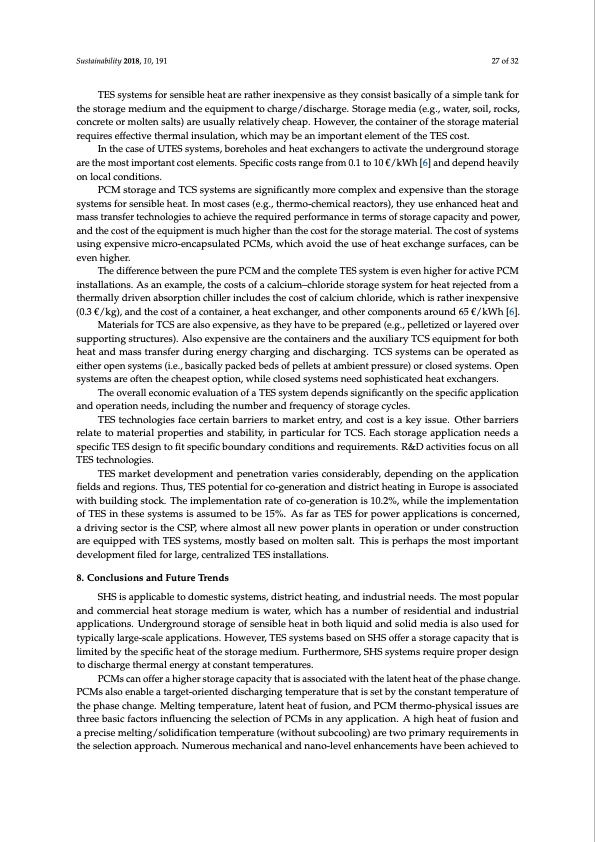
PDF Publication Title:
Text from PDF Page: 027
Sustainability 2018, 10, 191 27 of 32 TES systems for sensible heat are rather inexpensive as they consist basically of a simple tank for the storage medium and the equipment to charge/discharge. Storage media (e.g., water, soil, rocks, concrete or molten salts) are usually relatively cheap. However, the container of the storage material requires effective thermal insulation, which may be an important element of the TES cost. In the case of UTES systems, boreholes and heat exchangers to activate the underground storage are the most important cost elements. Specific costs range from 0.1 to 10 €/kWh [6] and depend heavily on local conditions. PCM storage and TCS systems are significantly more complex and expensive than the storage systems for sensible heat. In most cases (e.g., thermo-chemical reactors), they use enhanced heat and mass transfer technologies to achieve the required performance in terms of storage capacity and power, and the cost of the equipment is much higher than the cost for the storage material. The cost of systems using expensive micro-encapsulated PCMs, which avoid the use of heat exchange surfaces, can be even higher. The difference between the pure PCM and the complete TES system is even higher for active PCM installations. As an example, the costs of a calcium–chloride storage system for heat rejected from a thermally driven absorption chiller includes the cost of calcium chloride, which is rather inexpensive (0.3 €/kg), and the cost of a container, a heat exchanger, and other components around 65 €/kWh [6]. Materials for TCS are also expensive, as they have to be prepared (e.g., pelletized or layered over supporting structures). Also expensive are the containers and the auxiliary TCS equipment for both heat and mass transfer during energy charging and discharging. TCS systems can be operated as either open systems (i.e., basically packed beds of pellets at ambient pressure) or closed systems. Open systems are often the cheapest option, while closed systems need sophisticated heat exchangers. The overall economic evaluation of a TES system depends significantly on the specific application and operation needs, including the number and frequency of storage cycles. TES technologies face certain barriers to market entry, and cost is a key issue. Other barriers relate to material properties and stability, in particular for TCS. Each storage application needs a specific TES design to fit specific boundary conditions and requirements. R&D activities focus on all TES technologies. TES market development and penetration varies considerably, depending on the application fields and regions. Thus, TES potential for co-generation and district heating in Europe is associated with building stock. The implementation rate of co-generation is 10.2%, while the implementation of TES in these systems is assumed to be 15%. As far as TES for power applications is concerned, a driving sector is the CSP, where almost all new power plants in operation or under construction are equipped with TES systems, mostly based on molten salt. This is perhaps the most important development filed for large, centralized TES installations. 8. Conclusions and Future Trends SHS is applicable to domestic systems, district heating, and industrial needs. The most popular and commercial heat storage medium is water, which has a number of residential and industrial applications. Underground storage of sensible heat in both liquid and solid media is also used for typically large-scale applications. However, TES systems based on SHS offer a storage capacity that is limited by the specific heat of the storage medium. Furthermore, SHS systems require proper design to discharge thermal energy at constant temperatures. PCMs can offer a higher storage capacity that is associated with the latent heat of the phase change. PCMs also enable a target-oriented discharging temperature that is set by the constant temperature of the phase change. Melting temperature, latent heat of fusion, and PCM thermo-physical issues are three basic factors influencing the selection of PCMs in any application. A high heat of fusion and a precise melting/solidification temperature (without subcooling) are two primary requirements in the selection approach. Numerous mechanical and nano-level enhancements have been achieved toPDF Image | Comprehensive Review of Thermal Energy Storage

PDF Search Title:
Comprehensive Review of Thermal Energy StorageOriginal File Name Searched:
a554bca3a326b394928e3ab67fdd8d40c756.pdfDIY PDF Search: Google It | Yahoo | Bing
Turbine and System Plans CAD CAM: Special for this month, any plans are $10,000 for complete Cad/Cam blueprints. License is for one build. Try before you buy a production license. More Info
Waste Heat Power Technology: Organic Rankine Cycle uses waste heat to make electricity, shaft horsepower and cooling. More Info
All Turbine and System Products: Infinity Turbine ORD systems, turbine generator sets, build plans and more to use your waste heat from 30C to 100C. More Info
CO2 Phase Change Demonstrator: CO2 goes supercritical at 30 C. This is a experimental platform which you can use to demonstrate phase change with low heat. Includes integration area for small CO2 turbine, static generator, and more. This can also be used for a GTL Gas to Liquids experimental platform. More Info
Introducing the Infinity Turbine Products Infinity Turbine develops and builds systems for making power from waste heat. It also is working on innovative strategies for storing, making, and deploying energy. More Info
Need Strategy? Use our Consulting and analyst services Infinity Turbine LLC is pleased to announce its consulting and analyst services. We have worked in the renewable energy industry as a researcher, developing sales and markets, along with may inventions and innovations. More Info
Made in USA with Global Energy Millennial Web Engine These pages were made with the Global Energy Web PDF Engine using Filemaker (Claris) software.
Sand Battery Sand and Paraffin for TES Thermo Energy Storage More Info
| CONTACT TEL: 608-238-6001 Email: greg@infinityturbine.com | RSS | AMP |